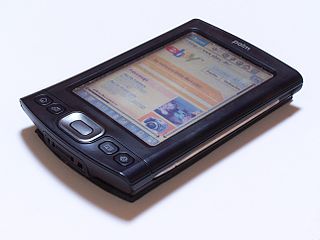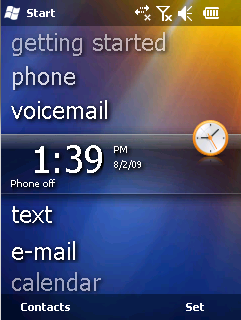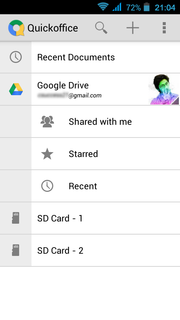
Microsoft Office, or simply Office, is a family of client software, server software, and services developed by Microsoft. It was first announced by Bill Gates on August 1, 1988, at COMDEX in Las Vegas. Initially a marketing term for an office suite, the first version of Office contained Microsoft Word, Microsoft Excel, and Microsoft PowerPoint. Over the years, Office applications have grown substantially closer with shared features such as a common spell checker, OLE data integration and Visual Basic for Applications scripting language. Microsoft also positions Office as a development platform for line-of-business software under the Office Business Applications brand. On July 10, 2012, Softpedia reported that Office was being used by over a billion people worldwide.

A personal digital assistant (PDA), also known as a handheld PC, is a variety mobile device which functions as a personal information manager. PDAs have been mostly displaced by the widespread adoption of highly capable smartphones, in particular those based on iOS and Android.

The Sony CLIÉ is a series of personal digital assistants (PDAs) running the operating system (OS) Palm OS, developed and marketed by Sony from 2000 to 2005. The devices introduced many new features to the PDA market, such as a jog-wheel interface, high-resolution displays, and Sony technologies like Memory Stick slots and ATRAC3 audio playback. Most models were designed and manufactured in Japan. The name is an acronym for creativity, lifestyle, innovation, emotion though formerly communication, link, information and entertainment. It was initially an attempt at a new coinage term, though it means "tool" in the Jèrriais language.

Palm OS is a discontinued mobile operating system initially developed by Palm, Inc., for personal digital assistants (PDAs) in 1996. Palm OS was designed for ease of use with a touchscreen-based graphical user interface. It is provided with a suite of basic applications for personal information management. Later versions of the OS have been extended to support smartphones. Several other licensees have manufactured devices powered by Palm OS.

WPS Office is an office suite for Microsoft Windows, macOS, Linux, iOS, Android, and HarmonyOS developed by Zhuhai-based Chinese software developer Kingsoft. It also comes pre-installed on Fire tablets. WPS Office is made up of three primary components: WPS Writer, WPS Presentation, and WPS Spreadsheet.

Windows Mobile is a discontinued family of mobile operating systems developed by Microsoft for smartphones and personal digital assistants.

Microsoft OneNote is a note-taking program for free-form information gathering and multi-user collaboration. It gathers users' notes, drawings, screen clippings, and audio commentaries. Notes can be shared with other OneNote users over the Internet or a network. OneNote is available as part of the Microsoft Office suite, it is also available as a free, standalone app via the official website, the app stores of Windows 10, macOS, iOS and Android. Microsoft also provides a web-based version of OneNote as part of OneDrive and Office for the web.

ActiveSync is a mobile data synchronization app developed by Microsoft, originally released in 1996. It synchronizes data with handheld devices and desktop computers. In the Windows Task Manager, the associated process is called wcescomm.exe.

TextMaker is a word processor developed by the German company SoftMaker and available as part of the SoftMaker office suite. TextMaker is available for Windows, MacOS, Linux and Android. Some reduced versions of TextMaker are released as freeware.
SoftMaker Software GmbH is a German software company based in Nuremberg that produces office productivity software and digital fonts. SoftMaker was founded in 1989 by Martin Kotulla. Best known in Germany and the EU, SoftMaker is offering its software worldwide.
This is an overview of software support for the OpenDocument format, an open document file format for saving and exchanging editable office documents.
A mobile operating system is an operating system for mobile phones, tablets, smartwatches, 2-in-1 PCs, smart speakers, or other mobile devices. While computers such as typical laptops are 'mobile', the operating systems used on them are generally not considered mobile ones, as they were originally designed for desktop computers that historically did not have or need specific mobile features. This distinction is becoming blurred in some newer operating systems that are hybrids made for both uses.

Quickoffice is a discontinued freeware proprietary productivity suite for mobile devices which allows viewing, creating and editing documents, presentations and spreadsheets. It consists of Quickword, Quicksheet and QuickPoint. The programs are compatible with Microsoft Office file formats, but not the OpenDocument file format.

Google Sheets is a spreadsheet program included as part of the free, web-based Google Docs Editors suite offered by Google. The service also includes Google Docs, Google Slides, Google Drawings, Google Forms, Google Sites, and Google Keep. Google Sheets is available as a web application, mobile app for Android, iOS, Windows, BlackBerry, and as a desktop application on Google's Chrome OS. The app is compatible with Microsoft Excel file formats. The app allows users to create and edit files online while collaborating with other users in real-time. Edits are tracked by user with a revision history presenting changes. An editor's position is highlighted with an editor-specific color and cursor and a permissions system regulates what users can do. Updates have introduced features using machine learning, including "Explore", offering answers based on natural language questions in a spreadsheet.

Microsoft Office 2016 is a version of the Microsoft Office productivity suite, succeeding both Office 2013 and Office for Mac 2011 and preceding Office 2019 for both platforms. It was released on macOS on July 9, 2015, and on Microsoft Windows on September 22, 2015, for Office 365 subscribers. Mainstream support ended on October 13, 2020, and most editions have extended support up to October 14, 2025. The perpetually licensed version on macOS and Windows was released on September 22, 2015. Office 2016 requires Windows 7 SP1, Windows Server 2008 R2 SP1 or OS X Yosemite or later. It is the last version of Microsoft Office to support Windows 7 SP1, Windows Server 2008 R2 SP1, Windows 8, Windows Server 2012, Windows 8.1, Windows Server 2012 R2, Windows 10 versions below 1809 and Windows Server 2016, as the following version, Microsoft Office 2019 will only support Windows 10 versions 1809 or later and Windows Server 2019.

OfficeSuite is a cross-platform office suite application developed by MobiSystems. It has versions for Android, iOS and Microsoft Windows (PC) and adds extensive PDF abilities to its compatibility with the most frequently used Microsoft Office file formats. The software has over 220 million downloads on Google Play and is among the top Android business applications.

Pocket PC 2000 is the first member of the Windows Mobile family of mobile operating systems that was released on April 19, 2000, and was based on Windows CE 3.0. It is the successor to the operating system aboard Palm-size PCs. Backwards compatibility was retained with such Palm-size PC applications. Pocket PC 2000 was intended mainly for Pocket PC devices, however several Palm-size PC devices had the ability to be updated also. Further, several Pocket PC 2000 phones were released, however Microsoft's "Smartphone" hardware platform was not yet created. The only resolution supported by this release was 240 x 320 (QVGA). Removable storage card formats that were supported were CompactFlash and MultiMediaCard. At this time Pocket PC devices had not been standardized with a specific CPU architecture. As a result, Pocket PC 2000 was released on multiple CPU architectures; SH-3, MIPS, and ARM. Infrared (IR) File beaming capability was among the original hardware features.













